Politics
India’s Election Commission under fire from opposition
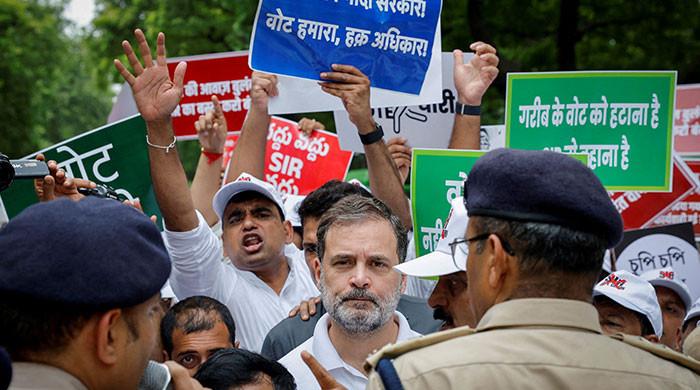
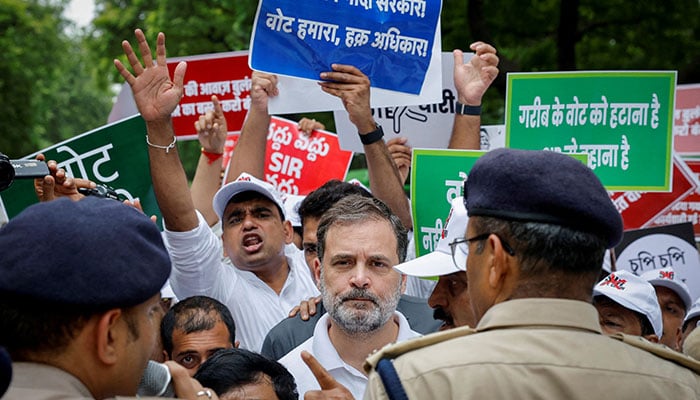
- Opposition, critics allege large-scale rigging impacting polls results.
- Election Commission of India denies charges — first ever in history.
- Rahul Gandhi demands ECI to release digital voter rolls for audit.
NEW DELHI: The Election Commission of India, long regarded as the impartial guardian of the world’s largest democracy, is facing unprecedented scrutiny over its credibility and independence.
Opposition leaders and critics have alleged that large-scale rigging of elections is impacting the overall results of the vote. The ECI has denied all charges, the first against it in India’s history.
Heading the charge is the leader of the opposition in New Delhi’s parliament, Rahul Gandhi of the Congress party, who previously alleged that India’s electronic voting machines are flawed.
Now Gandhi has accused the ECI of refusing to share digital voter records, detailing what he said was a list of errors after his supporters spent weeks combing through vast piles of registration lists by hand.
Allegations
Gandhi, 55, said his party lost dozens of seats in the 2024 parliamentary elections because of vote rigging.
The largest democratic exercise in human history across the country of 1.4 billion people was staggered over six weeks.
Gandhi claimed that the ECI manipulated voter rolls to favour Prime Minister Narendra Modi´s Bharatiya Janata Party (BJP).
Modi, 74, won a historic third term last year but fell short of a majority.
The alleged rigging involved a string of tactics, according to Gandhi.
He said some people voted multiple times, citing bulk registrations from one dwelling and seemingly bogus addresses.
In a presentation to reporters on August 7, Gandhi pointed to a parliamentary constituency his party narrowly lost as an “open and shut” example of the alleged irregularities.
Over 100,000 “fake” votes were cast in the constituency, he said, courtesy of duplicate voters.
His Congress party lost the seat by just over 30,000 votes.
“Our demand from the ECI is clear — be transparent and release digital voter rolls so that people and parties can audit them,” Gandhi said.
ECI’s stance
The ECI has called Gandhi’s accusation “false and misleading”.
India’s chief election commissioner said they would “never” back down from their constitutional duties.
“Politics is being done using the Election Commission… as a tool to target India’s voters,” Gyanesh Kumar told a news conference this month.
“The Election Commission wants to make it clear that it fearlessly stands rock-solid with all voters […] without any discrimination and will continue to do so.”
Kumar also said those alleging fraud either need to furnish proof under oath or apologise.
“An affidavit must be submitted or an apology to the nation must be made — there is no third option.”
Why now?
Gandhi launched a month-long “voter rights” rally in the key battleground state of Bihar on August 17, receiving enthusiastic public response.
The allegations come ahead of elections in Bihar in October or November. The opposition alleged the ECI had embarked on a “mass disenfranchisement” exercise, after it gave voters in the state just weeks to prove their citizenship, requiring documents that few possess in a registration revamp.
India’s top court stepped in last week, allowing a biometric ID most residents possess to be accepted in Bihar’s voter registration.
The “Special Intensive Revision” (SIR) of voter registration is set to be replicated across India.
Gandhi called the exercise in Bihar the “final conspiracy”.
Activists have reported finding numerous living voters declared dead by election officials, and entire families struck off draft lists. Voter verification in Bihar is scheduled to be completed by September 25, with the final list released five days later.
“They aim to steal the elections by adding new voters under the guise of SIR and removing existing voters,” Gandhi said.
The ECI has defended the registration revision, saying it is in part to avoid “foreign illegal immigrants” from voting.
Members of Modi’s BJP have long claimed that large numbers of undocumented Muslim migrants from neighbouring Bangladesh have fraudulently entered India’s electoral rolls.
Criticism mounted after the ECI replaced Bihar’s machine-readable voter records with scanned image files that do not allow text searches.
Critics said the changes made detecting anomalies more time-consuming and prone to error.
Politics
Former South Korean president yoon sentenced to five years in prison
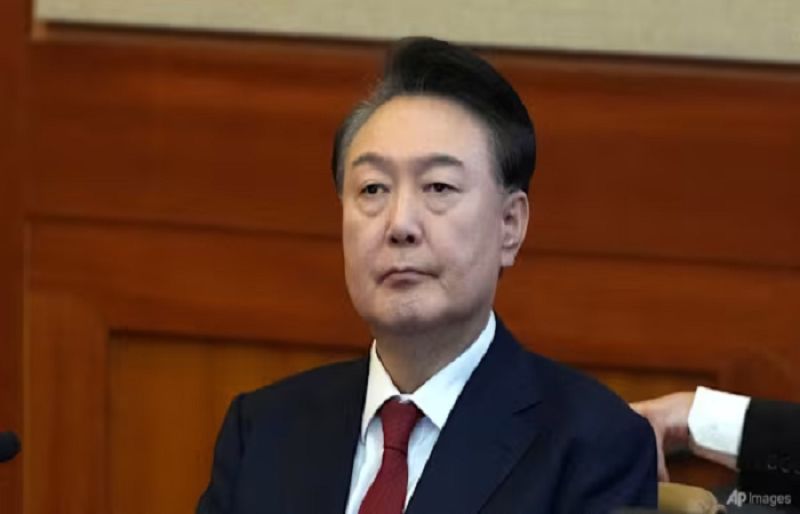

A South Korean court on Friday sentenced former President Yoon Suk Yeol to five years in prison on charges that included obstructing attempts by authorities to arrest him following his failed bid to impose martial law in December 2024.
The Seoul Central District Court found Yoon guilty of mobilising the presidential security service to block authorities from executing an arrest warrant that had been legally issued by a court to investigate him for his martial law declaration.
In televised proceedings, he was also found guilty of charges that included fabricating official documents and failing to comply with the legal process required for martial law.
The ruling is the first related to the criminal charges Yoon faces over his botched martial law declaration.
“The defendant abused his enormous influence as president to prevent the execution of legitimate warrants through officials from the Security Service, which effectively privatised officials … loyal to the Republic of Korea for personal safety and personal gain,” the lead judge on the three-justice panel said.
Speaking outside the court immediately after the decision, one of Yoon’s lawyers, Yoo Jung-hwa, said the former president would appeal the ruling. “We express regret that the decision was made in a politicised manner,” she said.
He could face the death sentence in a separate trial on a charge of masterminding an insurrection by declaring martial law without justification.
Yoon has argued it was within his powers as president to declare martial law and that the action was aimed at sounding the alarm over the obstruction of government by opposition parties.
Yoon, who also denied Friday’s charges, could have faced up to 10 years in jail over the obstruction charges related to when he barricaded himself inside his residential compound in January last year and ordered the security service to block investigators.
He was finally arrested in a second attempt involving more than 3,000 police officers. Yoon’s arrest was the first ever for a sitting president in South Korea.
Parliament, joined by some members of Yoon’s conservative party, voted within hours to overturn his surprise martial law decree and later impeached him, suspending his powers.
He was removed from office in April last year by the Constitutional Court, which ruled he violated the duties of his office.
While Yoon’s bid to impose martial law lasted only about six hours, it sent shockwaves through South Korea, which is Asia’s fourth-largest economy, a key US security ally, and long considered one of the world’s most resilient democracies.
Politics
South Korean ex-leader jailed for 5 years in first martial law verdict
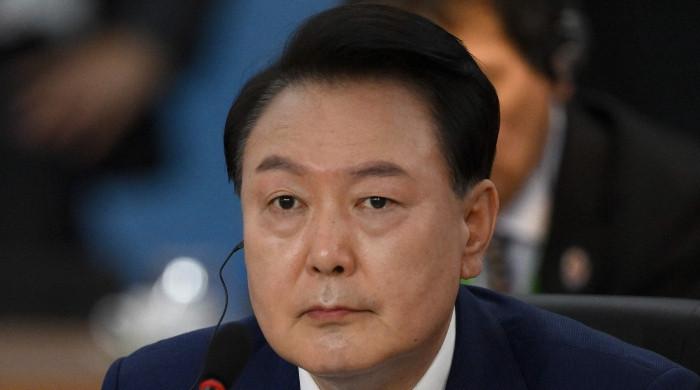
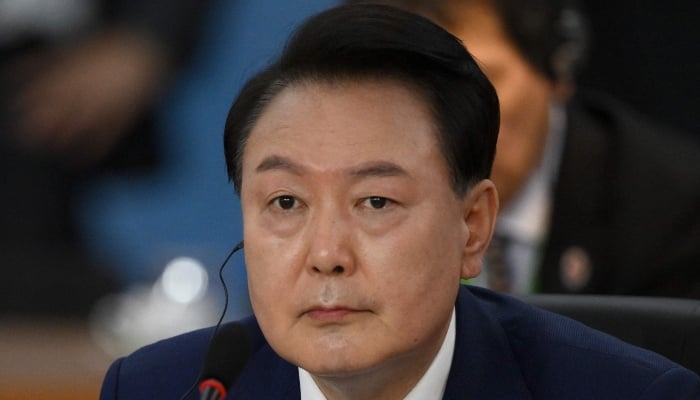
- Judge finds Yoon guilty of obstructing justice and other crimes.
- Separate insurrection verdict is scheduled for February 19.
- Yoon faces another trial over alleged drone flights to North Korea.
SEOUL: A South Korean judge sentenced former president Yoon Suk Yeol on Friday to five years in prison for obstructing justice and other crimes linked to his disastrous martial law declaration and in its chaotic aftermath.
It is the first in a series of verdicts for the disgraced ex-leader, whose brief suspension of civilian rule in South Korea on December 3, 2024 prompted massive protests and a showdown in parliament.
Now ousted from power, he faces multiple trials for actions taken during that debacle and in the turmoil that followed.
On Friday Judge Baek Dae-hyun at Seoul’s Central District Court said he found Yoon guilty of obstruction of justice by blocking investigators from detaining him.
Yoon was also found guilty of excluding cabinet members from a martial law planning meeting.
“Despite having a duty, above all others, to uphold the Constitution and observe the rule of law as president, the defendant instead displayed an attitude that disregarded the… Constitution,” Baek said.
“The defendant’s culpability is extremely grave,” he said.
But Yoon was not guilty of forging official documents due to lack of evidence, the judge said.
Yoon has seven days to appeal, he added.
Prosecutors had called for a 10-year prison term, while Yoon had insisted no law was broken.
Yoon defiant
It comes days after prosecutors in a separate case demanded Yoon be sentenced to death for his role as the “ringleader of an insurrection” in orchestrating the imposition of martial law.
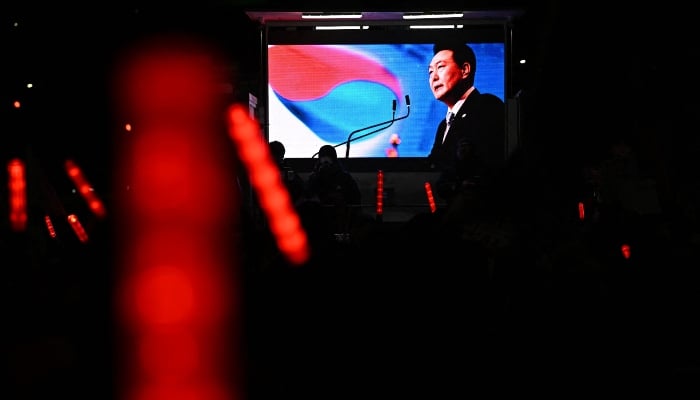
They argued Yoon deserved the severest possible punishment as he had shown “no remorse” for actions that threatened “constitutional order and democracy”.
If he is found guilty it is highly unlikely the sentence will actually be carried out, as South Korea has had an unofficial moratorium on executions since 1997.
Yoon was seen smiling in court as the prosecutors demanded the punishment.
And the former leader and top prosecutor has remained defiant, saying his martial law declaration was a lawful exercise of his presidential authority.
In closing remarks on Tuesday, he insisted the “exercise of a president’s constitutional emergency powers to protect the nation and uphold the constitutional order cannot be deemed an act of insurrection”.
He accused the then-opposition party of having imposed an “unconstitutional dictatorship” through their control of the legislature.
“There was no other option but to awaken the people, who are the sovereign.”
The court is scheduled to rule on the insurrection charges on February 19.
Yoon also faces a separate trial on charges of aiding the enemy, over allegations he ordered drone flights over North Korea to bolster his case for declaring martial law.
Politics
Trump accepts Nobel medal from Venezuelan opposition leader Machado
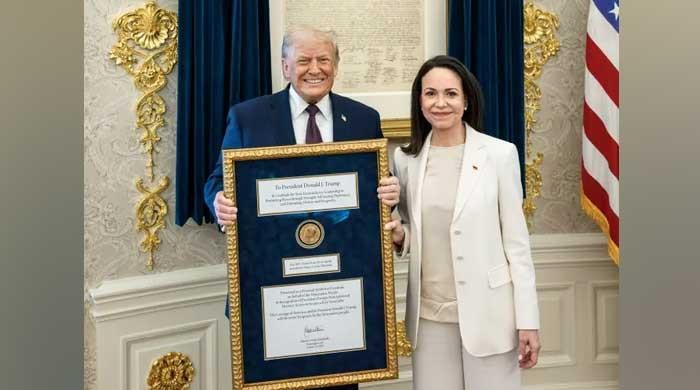
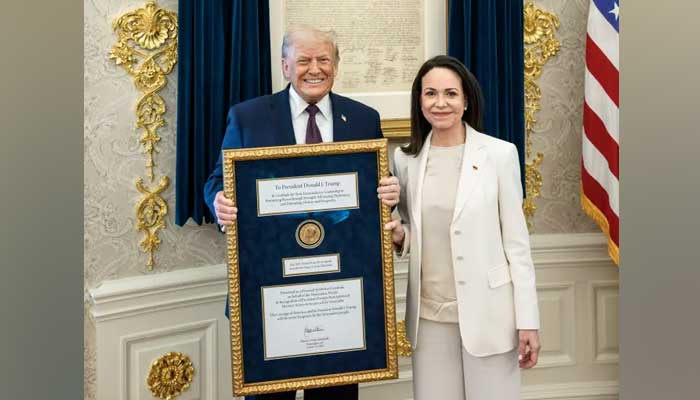
- Machado says meeting was ‘excellent,’ but did not elaborate.
- Encounter comes as Trump has praised Caracas’ interim leader.
- Trump has prioritised securing access to Venezuelan oil.
WASHINGTON: Venezuelan opposition leader Maria Corina Machado gave her Nobel Peace Prize medal to US President Donald Trump on Thursday during a White House meeting, as she tries to gain some influence over how the president shapes the South American country’s political future.
A White House official confirmed that Trump intends to keep the medal.
In a social media post on Thursday evening, Trump wrote: “Maria presented me with her Nobel Peace Prize for the work I have done. Such a wonderful gesture of mutual respect. Thank you Maria!”
Machado, who described the meeting as “excellent,” said the gift was in recognition of what she called his commitment to the freedom of the Venezuelan people.
Machado’s attempt to sway Trump came after he dismissed the idea of installing her as Venezuela’s leader to replace the deposed Nicolas Maduro. Trump openly campaigned for the prize before Machado was awarded it last month and complained bitterly when he was snubbed.
Though Machado gave Trump the gold medal that honorees receive with the prize, the honor remains hers; the Norwegian Nobel Institute has said the prize cannot be transferred, shared or revoked.
Asked on Wednesday if he wanted Machado to give him the prize, Trump told Reuters: “No, I didn’t say that. She won the Nobel Peace Prize.”
The Republican president long expressed interest in winning the prize and has at times linked it to diplomatic achievements.
The lunch meeting, which appeared to last slightly over an hour, marked the first time the two have met in person. Machado then met with more than a dozen senators, both Republican and Democratic, on Capitol Hill, where she has generally found more enthusiastic allies.
While the visit was ongoing, White House press secretary Karoline Leavitt said Trump had been looking forward to meeting Machado, but that he stood by his “realistic” assessment that she did not currently have the support needed to lead the country in the short term.
Machado, who fled Venezuela in a daring seaborne escape in December, is competing for Trump’s ear with members of Venezuela’s government and seeking to ensure she has a role in governing the nation going forward.
After the US captured Maduro in a snatch-and-grab operation this month, various opposition figures, members of Venezuela’s diaspora and politicians throughout the US and Latin America have expressed hope that Venezuela will begin the process of democratisation.
-

 Politics1 week ago
Politics1 week agoUK says provided assistance in US-led tanker seizure
-

 Entertainment1 week ago
Entertainment1 week agoDoes new US food pyramid put too much steak on your plate?
-

 Entertainment1 week ago
Entertainment1 week agoWhy did Nick Reiner’s lawyer Alan Jackson withdraw from case?
-

 Sports5 days ago
Sports5 days agoClock is ticking for Frank at Spurs, with dwindling evidence he deserves extra time
-

 Business1 week ago
Business1 week agoTrump moves to ban home purchases by institutional investors
-

 Sports1 week ago
Sports1 week agoPGA of America CEO steps down after one year to take care of mother and mother-in-law
-

 Tech4 days ago
Tech4 days agoNew Proposed Legislation Would Let Self-Driving Cars Operate in New York State
-

 Business1 week ago
Business1 week agoBulls dominate as KSE-100 breaks past 186,000 mark – SUCH TV






